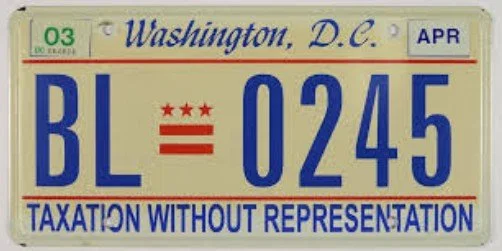From the Editor’s Desk: D.C. Statehood NOW!
Washington, D.C. is home to more than 700,000 people—more than Wyoming or Vermont. Its residents pay more in federal taxes per capita than any state. They serve in our military, they start businesses, they raise families, and they live under the same federal laws as everyone else. But when it comes to representation in Congress, they have the same voting power as you or I have in the British Parliament: none.
This democratic deficit isn’t just an abstract injustice—it’s a structural weakness that can be exploited, as we saw this week. On Monday, President Trump invoked a little-used provision of the D.C. Home Rule Act to take control of the city’s police force and deploy 800 National Guard troops, citing a “public safety emergency.” The move came despite the fact that violent crime in the District is at a 30-year low.
For the next 30 days—and possibly longer—the Metropolitan Police Department will answer to the U.S. Attorney General, not the mayor elected by D.C. residents. Local leaders, including Mayor Muriel Bowser, called the action “unsettling and unprecedented.” The D.C. Attorney General went further, calling it “unnecessary and unlawful.” But under current law, they have no legal recourse. Congress controls the District, and the president can federalize its police at will.
This is the kind of federal overreach California was able to resist when it clashed with the Trump administration over immigration enforcement in Los Angeles. As a state, California had constitutional powers to set its own policies and take the federal government to court—and win. D.C., by contrast, is powerless. Without statehood, it has no Senate representation, no governor, no legislature, and no sovereignty over its own laws or security.
Some critics of statehood point to the Constitution’s provision for a federal district, but the slave owners who wrote that document envisioned a small administrative hub—not a thriving city of permanent residents, many of whom are people of color, stripped of the rights enjoyed by every other American.
And it is precisely this, the “threat” of a state of majority Black voters that keeps it as a district. In the same vein, it is what prevents Puerto Ricco from becoming a state. It is what Hawaii faced last century.
The federated republic of the U.S. is a deeply flawed one, but it is a republic nonetheless that we can work within to secure greater liberties for people. It is also, unfortunately, a system white supremacists, capitalists, and authoritarians can operate within as well, skirting democracy and disenfranchising hundreds of thousands of voters.
Yet, if these arguments still are not convincing let’s provide this context: D.C. could easily become a state. There is nothing in the Constitution that prevents this. We could easily read the Constitution’s call for a capital to be a reduced federal enclave containing only core national buildings and properties, leaving the rest of the city free to govern itself as a state.
This would keep the capital out of the hands of one state, and more importantly enfranchise citizens of the U.S. to exercise basic democratic rights.
Statehood wouldn’t just be symbolic. It would give D.C. the same defensive tools every state has to challenge unlawful federal interference. It would allow residents to elect voting senators who could block overreach before it happens. It would give the District control over its own National Guard and police force, so that law enforcement answers to the people it serves—not to a president’s political whims.
Furthermore, the plans of the Trump Administration are emerging like a bad moon rising. If they are successful in the seizure of local government in D.C. then they will use this as a model to target other cities that are majority people of color. Chicago, NYC, Atlanta, Detroit. And it will be the unhoused of these cities that are hit the hardest. The Trump Administration has openly stated they want to be able to snatch Americans from the streets (as they are already doing with foreign nationals) ship them to the growing concentration camps in the American South, and then deport them to countries they deem “fit.”
This assault on the sovereignty of our cities, which D.C. is at the frontline, is nothing short of a question of will we tolerate our government to return to the centuries of the American slave trade?
The slogan on D.C. license plates says it plainly: “Taxation Without Representation.” It was once the rallying cry of a revolution. If we truly believe in self-government, we must extend it to the people who live in the shadow of the Capitol dome. Otherwise, the events of this week will be only a preview of how easily democracy in the District can be suspended.
Congress has the power to fix this. The question is whether it has the courage. The answer to that is simple— They do not. So, the next question is— Are we going to force them to do this? For the next thirty days we have the chance to build on the resistance to Trump’s overreach and demand equality for the residents of D.C. Let us fight, be vigil, and not waste this opportunity.
Wesley R. Bishop
Managing Editor
North Meridian Press
Alabama
